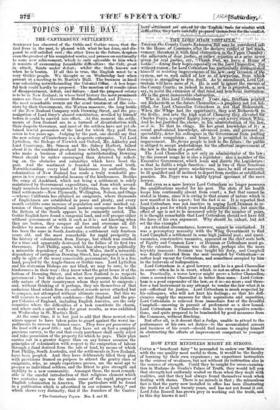1 Jaom sib lc : ; 5Rrtt la ile-:1 1
a9,,..?.-•e:, II- m:s .A: ) :s 1 I ssei Kan o •
• .C3911L
e. t : AMA • ■ .1 ,4 111 la ima
'• ..- -
• li191. 1).
.0
gi • •,, tet 4 .1▪ 1.1:' i °AA ;. • I iruiliciurf, ethaasslheress.
t
'IA" • ri,:liT7' ng I. - . &? el
• .• '112 • 1111 •
e'
i•Rt".4' • 1:4 r. ot,L.41. s' "2 Si s es, ar a : °Trs I.
Ii S
0 e
1 II
11 1
21:
/519:15filsi Cr Pq ' eli in resisting isyst,enssmit ssb, rtsenutQVIs_.vfoii,s ithesesatistys, 70),k.p.s* .94PNe, The:Lord Chancellor is not only an adminis t,er;of: the law; by -the present usage he is also a legislator ; alesiss' Tuber of the:
Executive Government, which leads an • islature : so that he fulfils a triple function ; and `* ;Ise functions .
a mere lawyer must _prove mischievous' ne'si• necessity
be ill qualified and. ill inclined to departfio usetnblishe4
practice. • Mr. PepYs was a highly iemil specimen of the mere
lawyer. .
But even as a Mere lawyer Lord Cottenham no longer possesses the qualifications needed for his post. The state of his health keeps him continually absent from court ; a fact that canna be stated in blame, since it is owing to that course Of nature which iS now manifest in his aspect; but the fact is so. It ii reported that Lord. Cottenhnm. was not.inactive Als.rging Lord Denman to re- linquish a post for Which years had qualifedhisa : but since the effect of age is not to be measured's° ely by-the number of ye it is thought remarkable that Lord Cottenham should not have fel s, the force of his own argument. Why should he exhort, but set the {brit example P ,
An attendant circumstance, however, cannot be overlooked., It was a peremptory necessity with the Whig Government te find. Lord Campbell a settlement in some high judicial post ; and quasi-
vacancies, constructive vacancies, appeared on the chief seats both of Equity and Common Law: or Denman iii3Oottenhans must go.
By the calendar, Denman was the older, peips alio the more
boyishly innocent : Denman was taliffins duty; and Campbell was finally diiiited;fieniS the ''ibyiOolthñhaiE ratherkept vaea.nt for Cottenham, and. sometimes occupied by hinrs
hi the intervals of indisposition. •
:Lord Cotterthara is .a good lawyers and he ice goodsChancellor in. nowt—when, he is in :court, which ',is notesosoften-as it used tof be. Practically, a worse lawyer might prove a better Chaneellonfe sines, a second-rate Chancellor • is better thaw mum 1.1:Lard: 'Gotta- hat: is • a lgood expounder•of the law,:as4 iüi4-'-noiliçite';'iandtltere-
fore' a bad instrument' in any attempt tor. render theila*•whatit is nob—effectual •for. justice. Lord Cettenhara is Much respected by his colleagues, who will not hurt his feelings ; so that his slefis - ciencies supply the measure for their aspirations and capacities:. Lord Cottenham is relieved from immediate fear of the dreadful. Campbells—unerring in pursuit of preferment as a slow hound. Lord Cottenham is Chancellor—firm in his own negative convic- tions, and quite prepared to be bombarded by good measures from. the Commons, without flinching.
But after all, is it decent that a Judge, unable to attend to the performance of his own- set duties—to the accumulated arrears and business of his court—should find means to employ himself in obstructing the efforts at improvement competent to younger men?
Tigfffi' R171711 g, • • • A. • 1:.. thejlolls ; .andtsistoi Charles Pepys; spa • And he has juM Os it is. To t sound prafess' spootz,boy, r jus.,eo •IC• him tinder compulsion ; hence . inspsevement. Referees people to XO4 is.ot•lized:to accept undertakings for the the him in the form of post-obit.
,
en,.
trfts j."01 lett,418:1;" 1I4 , • , • ?..ert 3i 0 ' ' "g" mi Won% Pr iro I 1 t
Yr) PiTt,0(44 1 I t 11
st.
• -
I'Mui76Y1 8 'TX
,
.413 .11i• 24.1
it
1 l• II ; ' 410
I ; • 11
,JIrvrT(r III.
• • • ancJ1a , I .1, t
1-6111:o
a
R I lift0"/ fP Ad Alk911Yrftlxim TI:61,141Miav lior. • 1- Ai, cOr otsleini)ent I 6 Qt
III
•
oftrifit.
cliss swig • t
IITIf
11
t.
Mi L'ff 0
git,A


























 Previous page
Previous page